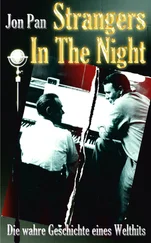Chris Bohjalian - The Night Strangers
Здесь есть возможность читать онлайн «Chris Bohjalian - The Night Strangers» весь текст электронной книги совершенно бесплатно (целиком полную версию без сокращений). В некоторых случаях можно слушать аудио, скачать через торрент в формате fb2 и присутствует краткое содержание. Жанр: Триллер, на английском языке. Описание произведения, (предисловие) а так же отзывы посетителей доступны на портале библиотеки ЛибКат.
- Название:The Night Strangers
- Автор:
- Жанр:
- Год:неизвестен
- ISBN:нет данных
- Рейтинг книги:5 / 5. Голосов: 1
-
Избранное:Добавить в избранное
- Отзывы:
-
Ваша оценка:
- 100
- 1
- 2
- 3
- 4
- 5
The Night Strangers: краткое содержание, описание и аннотация
Предлагаем к чтению аннотацию, описание, краткое содержание или предисловие (зависит от того, что написал сам автор книги «The Night Strangers»). Если вы не нашли необходимую информацию о книге — напишите в комментариях, мы постараемся отыскать её.
The Night Strangers — читать онлайн бесплатно полную книгу (весь текст) целиком
Ниже представлен текст книги, разбитый по страницам. Система сохранения места последней прочитанной страницы, позволяет с удобством читать онлайн бесплатно книгу «The Night Strangers», без необходимости каждый раз заново искать на чём Вы остановились. Поставьте закладку, и сможете в любой момент перейти на страницу, на которой закончили чтение.
Интервал:
Закладка:
And while radio communication is your lowest priority this second, you do tell the tower that there has been a bird strike. You begin with words that sound at once foreign and cinematic in your mind because you never anticipated saying them: “Burlington, we just had a bird strike and are declaring an emergency.”
“Roger. What do you need?” a cool female voice in the tower responds.
“Stand by,” you tell her simply, trying to focus. After a moment, she offers you a heading in the event you want to return to Burlington.
And, indeed, your first instinct is to make a wide, sweeping circle and land back at the airport. You left to the northwest on runway 33; perhaps you could loop back around and land on runway 15. But making a turn that large will cause the plane to lose a lot of altitude, and right now you’re only about twenty-five hundred feet in the air. You weren’t quite half a mile above the Champlain valley when that flock of geese darkened your windshield like a theater curtain. Your instincts tell you that you are never going to make it if you try for runway 15.
“Not happening,” you tell the tower. “We have no thrust in either engine.” An emergency landing at the airport is impossible.
And when you hear that voice from the tower next, you detect a twinge of panic in that usually professional facade: “Roger. State your intentions.”
You project alternate flight paths, scanning the Champlain valley. Maybe instead of Burlington you could glide across the lake to Plattsburgh-to the airport there. The old Air Force base in upstate New York. You can see the area in the far distance to the right, and the angle of the runways looks promising. But it’s not likely you have anywhere near the altitude or the speed to make it. And even if you do coax the crippled airliner across the lake, you will still have to adjust your approach: The angle of the runways is promising, not perfect, which means you might be crash-landing in a populated area. Moreover, the CRJ has very low wings. Not a lot of clearance as you scoot along ground that isn’t a long, flat patch of pavement. It would be easy to catch a wingtip and lose control. You have seen your share of videos of planes cartwheeling along the ground into fireballs.
But you have to bring the plane down somewhere, and you have to bring it down soon. Neither engine has restarted.
You know well how that other captain managed to crash-land a powerless jet-and that was an Airbus 320, an oil tanker compared to this relatively petite CRJ-in the Hudson River one cold but crystal clear January afternoon. It was considered a miracle, but mostly it was just excellent flying. Chesley Sullenberger had flown commercially for twenty-nine years and prior to that had been a fighter jock. Twenty-nine years versus your fourteen. Arguably, a considerable difference. But you still have a boatload of hours in the air.
Likewise, you know the story of the Lockheed Electra turboprop that sailed into thousands of starlings-some people estimated as many as ten thousand-on October 4, 1960. The plane and the birds collided seconds after takeoff from Logan Airport, only four hundred feet above the water in Boston Harbor. The engines stalled and the plane plummeted into the water, no more than two hundred yards from shore. This was no gentle, seemingly slow-motion glide. There were seventy-two people onboard. Miraculously, ten survived, largely because of the flotilla of small boats that descended on the wreckage.
And now it is August, and though the sky is that same cerulean blue as it had been that January day over New York, it is downright muggy outside. Before you looms Lake Champlain, wider than the Hudson but still long like a river. You notice two ferryboats, one venturing west to Plattsburgh and the other motoring east to Burlington. There must be a dozen sailboats. And there is the crystalline surface of all that warm August water. Warm. August. Water. You will bring your plane down there-nose up so the aircraft doesn’t flip-because it is your best option. It is, perhaps, your only option. You have two dead engines and the speed of the aircraft’s descent is accelerating. You will do precisely what Sullenberger did on the Hudson. You’ve read all about it. All pilots have.
The tower is asking you again where you want to land. That voice once more brings up Burlington. She tells you that they have stopped all incoming and outgoing traffic there. Then she suggests Plattsburgh.
“I’m going to use the lake the way he used the river,” you tell her evenly, not specifying who he is because you don’t have time and, really, you were just thinking aloud when you added that to your tower communication. And already you are turning your plane from the northwest to the south and watching the water start to rise up.
You wish it were possible to dump the fuel on this CRJ, and not simply because you fear an explosion and fire; you know that the plane would float longer if there were more air in the tanks. Still, the plane should float long enough if you do this correctly. And so you descend as if you were approaching an ordinary runway, nose up, flaps full. The ground proximity warning system kicks in, and a computerized voice starts repeating, “Terrain. Terrain. Terrain.” Soon it will become more urgent, insisting, “Pull up. Pull up.” As if you didn’t know. Behind you, your passengers in the first rows hear it, too.
In a moment you will give the command every captain dreads: “Brace for impact.” Then you will skim across Lake Champlain, landing from the north a few minutes past five on a summer afternoon, and your passengers will be rescued by those ferryboats and sailboats. They will not face the frigid waters of the Hudson River but will instead wait on the wings in the gentle summer bath of a New England lake or bob on the waves in those garish orange life rafts.
“Thrust levels all idle,” Amy tells you, shaking her head, just a trace of anxiety in her usually giddy, usually playful voice.
Without thrust, landing the plane will be all about pitch. Lowering the nose will give you more speed and a longer glide; raising it will slow the aircraft and shorten your time in the air. You want to belly into the lake as gently as possible, though gentle is a relative term. The water can feel like granite to the underbelly of a jet if you hit it at the wrong angle.
“No relight,” Amy tells you, essentially reiterating what she shared with you just a moment ago, speaking louder now because, in addition to having to be heard over the synthetic Cassandra telling you to pull up, pull up, pull up, your flight deck is alive with emergency chimes and bells and a controller who wants you in Burlington or Plattsburgh or (Did you hear this correctly?) the interstate highway in New York that runs parallel to the lake. But the asphalt linking Albany and Plattsburgh is no more an option than the asphalt on the runways at the airports on either side of the water. No, you will use the lake the way Chesley Sullenberger used the river, and soon your passengers will be wrapped in blankets on the decks of the ferries.
The plane is eighteen rows long along one side but only seventeen on the other so there is room for a second lavatory at the front of the aircraft. There are two doors at the front of the plane and two over the wings at row fourteen (though that is actually the unnamed thirteenth row). Everyone in the passenger cabin is agonizingly aware of their proximity to those four exits, but perhaps no one is more focused upon them right now than Ethan Stearns as he sits in an aisle seat in the very last row, barely a foot and a half from the rear lavatory. It is not his own safety that has him calculating in his mind the speed with which he will be able to fight his way through the chaotic, merciless swarm to those exit windows, assuming the plane actually remains intact after it hits the surface of the lake; it is the safety of his young daughter, Ashley, who is sitting in the window seat beside him. His wife, Ashley’s mother, is ten rows ahead of them. The plane is not full, but it seemed like a lot of work to have the gate agent reassign their seats so they could be closer together on the short trip to Philly. So, instead of his wife in the row ahead of him, there is a man he knows nothing about and a woman who, based on something she said into her cell before the doors were locked and armed, had just interviewed at the IBM facility in Essex Junction, Vermont.
Читать дальшеИнтервал:
Закладка:
Похожие книги на «The Night Strangers»
Представляем Вашему вниманию похожие книги на «The Night Strangers» списком для выбора. Мы отобрали схожую по названию и смыслу литературу в надежде предоставить читателям больше вариантов отыскать новые, интересные, ещё непрочитанные произведения.
Обсуждение, отзывы о книге «The Night Strangers» и просто собственные мнения читателей. Оставьте ваши комментарии, напишите, что Вы думаете о произведении, его смысле или главных героях. Укажите что конкретно понравилось, а что нет, и почему Вы так считаете.











